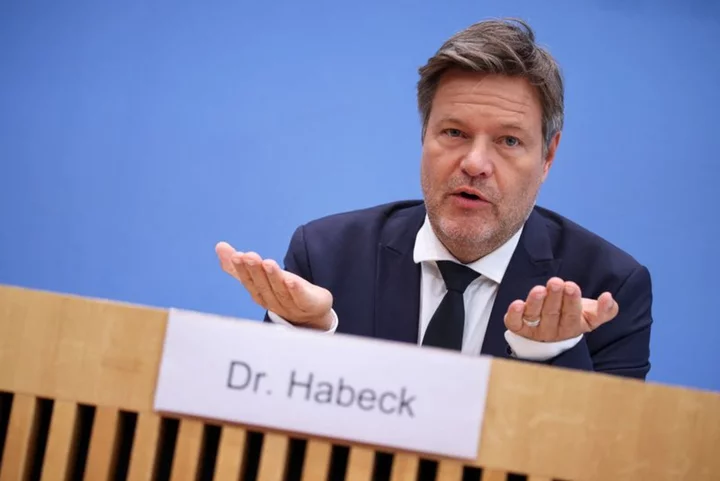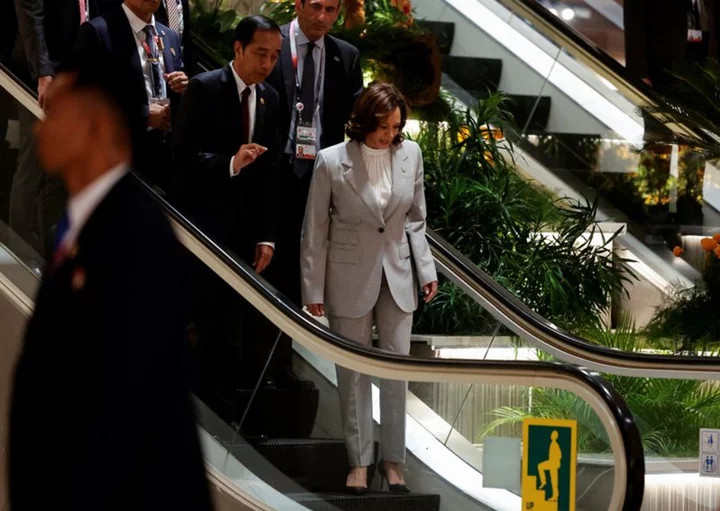By Markus Wacket and Andreas Rinke
BERLIN (Reuters) -German Economy Minister Robert Habeck on Monday criticised sticking to what he called the country's "inflexible" debt brake and took a swipe at Finance Minister Christian Lindner on prospective subsidy cuts, saying it was "all just talk".
The comments laid bare strains in Chancellor Olaf Scholz's ruling coalition after a court ruling last week that wiped 60 billion euros ($65 billion) from the federal budget sent the government scrambling for alternative sources of funding.
The finance ministry temporarily froze future spending pledges across almost the entire federal budget, a letter by the budget state secretary showed, in a sign of how seriously it was taking the potential fallout to its finances.
Two government sources warned that projects in areas key to Germany's industrial competitiveness were now at risk, including planned chip factories, expansion of the battery supply chain and decarbonisation of steel.
The government is considering whether to suspend Germany's constitutionally enshrined debt brake as a way out of the spending crunch, a source told Reuters, while a leading member of Scholz's own party also called for such a move.
Habeck, from the pro-spending Greens, has warned that the court ruling could severely impact Germany's ability to support its industry through a green transition and keep jobs and value creation from moving abroad.
He has pointed to legislation in other countries, in particular the 2022 Inflation Reduction Act in the United States, as examples of governments helping industry stay competitive.
But Lindner, from the fiscally conservative Free Democrats (FDP), is opposed to tax rises and loosening spending rules while the government assesses the extent of the fallout from the ruling during negotiations for next year's budget.
Asked about Lindner's assertion that the government would have to achieve more with fewer subsidies, Habeck said, "That's why it's all just talk. The reality is different."
"Where do you want to cut 60 billion in social benefits? That dramatically misses the drama of the situation," he told Deutschlandfunk radio.
Habeck said he was not proposing to abolish Germany's constitutionally enshrined debt brake, but added that "it is inflexible". He pointed to the lack of growth in Europe's largest economy and the challenges of high inflation and energy prices.
The finance ministry declined to comment while a government spokesperson said the extent of the issue was still being assessed. Lindner had over the weekend warned there would now be a lack of new government funding to support the economy and infrastructure.
"The short-term consequences are hard. In the long term we can gain advantages. We are now being forced to modernize the economy with fewer public subsidies," he told the Bild am Sonntag newspaper.
OPPOSITION RESURGENT
The court ruling, which said the government's move to transfer unused pandemic funds towards climate initiatives and industry support was illegal, has boosted the resurgent opposition CDU/CSU alliance, which brought the lawsuit.
Sebastian Brehm, a finance spokesperson for the CSU, criticised what he called Habeck's "unbearable insults" towards the opposition and the constitutional court.
"Because it is not the ruling of the constitutional court or the lawsuit by the CDU and CSU that endanger the economy and jobs," he said.
"Rather, it is the unsound and unconstitutional budget policy of the federal government and the (three-way) coalition. You alone are responsible for the consequences."
The opposition has said the budget for 2024 as it stands was not fit for purpose, but coalition lawmakers have insisted it would be on track to pass by the start of next month.
Attention is also now turning to other special off-budget funds that could be under threat of legal challenge, including a 200 billion euro Economic Stabilisation Fund (ESF).
"One possibility could be to suspend the debt brake in 2023 ... but then not in 2024. But everything is open," a government source told Reuters.
($1 = 0.9168 euros)
(Reporting by Markus Wacket, Christian Kraemer, Holger Hansen; Writing by Matthias Williams; Editing by Paul Simao and Stephen Coates)









